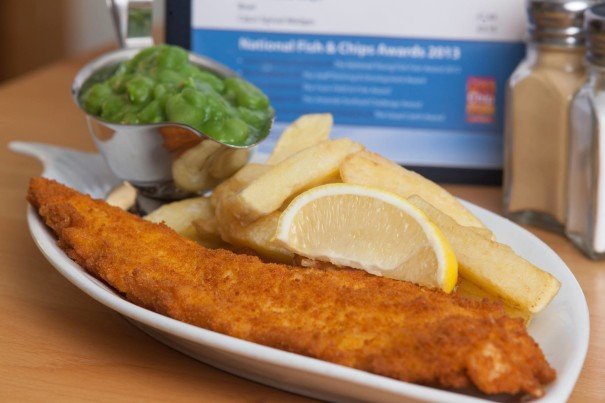
The Last Best Fish Shop in Britain

The Last Best Fish Shop in Britain
Fish and Chips in the Shetland Isles
Crunchy batter, sharp vinegar, and sodden chips, all packed up in a piercing polystyrene squeak. Fish and chips, that most British of culinary traditions, was brought to our shores by Sephardic Jews from Spain in the 16th century. Another religion, Roman Catholicism, instituted it as an end of the week tradition: according to doctrine, no meat was to be eaten on a Friday, so fish became an attractive substitute. Now, slathered in lumpy ketchup and acrid brown sauce, thousands of these suppers are scoffed every day across the Union. Today, in a very unlikely place, I’m about to try Britain’s best.
I’m at Frankie’s, recently crowned the U.K.’s best fish bar, for a battered brunch. The restaurant is housed in a small but glitzy shack in the town of Brae in the Shetland Isles, a sub-Arctic archipelago 100 miles from the Scottish mainland. Here, the wind blows harder than anywhere else I have ever been; the rain is thick and the days, during these harsh winter months, last a miserly six hours.
In front of me is a “peerie haddock”( peerie being the local word for small), four hunks of battered scallop, six meaty langoustine tails, a bucket of mussels and six deep-fried crab claws. It’s not all mine. Across from me is my dad, a man who has not only eaten his way across most of the globe but whose youth was spent gutting cod and haddock caught by his father. If anyone knows a good fish supper, it’s him.
Frankie’s is an organized place, with all the right things in all the right places. Its bright halogen lights cut antiseptically through the murk of the Shetland morning. The fresh paint smells stronger than the bubbling oil, and the furniture is resplendent in its IKEA sheen. On the wall, a high-resolution LCD screen reports my food’s sustainable provenance, and a crisp, shiny brochure happily supplies me with every one of the establishment’s deeds and decorations. In the kitchen, the chefs work with military precision, dishing out commands amid the gurgle and suck of fish fillets being dipped in batter. It’s the PR-perfect fish-shop of the future in the most isolated part of Britain.
More importantly, the fish is excellent.
The batter is as light as Japanese tempura, the haddock pearlescent. The bulky scallops, the red coral still attached, are tender and evade the over-fried-fibrousness of poorly cooked equivalents. The crab meat is sweet, the langoustines rich, and the mussels are like mini-marine steaks. Swilled down with piping hot mugs of milky tea, there is no more quintessential—no more stereotype-fulfilling—British gastronomic experience.
Indeed,the oleaginous ooze and burnt batter of the standard “chippy” are absent at Frankie’s. The batter is crispier, the fish tastier and the service friendlier than in any fish bar I’ve ever been. It’s just that, perched on the edge of Britain, it’s a long way to go to feed that Friday night habit.